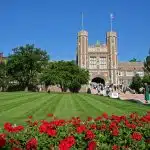Each year, thousands of students finish their undergraduate studies at Yale University. For the Class of 2024, a total of 1,665 bachelor’s degrees were awarded. When you break those numbers down, clear patterns emerge about where students are choosing to focus their studies.
This guide takes you through the ten most popular majors at Yale. Ranked by the share of bachelor’s degrees awarded, they show where students concentrate their studies and why these fields keep holding such strong appeal.
- What Are the Most Popular Majors at Yale?
- Social Sciences at Yale
- Biological and Life Sciences at Yale
- Computer and Information Sciences at Yale
- Interdisciplinary Studies at Yale
- Mathematics and Statistics at Yale
- History at Yale
- Engineering at Yale
- Visual and Performing Arts at Yale
- Area, Ethnic, and Gender Studies at Yale
- Physical Sciences at Yale
- Frequently Asked Questions
- Takeaways
What Are the Most Popular Majors at Yale?
To identify the most popular majors at Yale, we turn to the university’s Common Data Set. The figures below come from Yale’s 2024–2025 report and show the share of bachelor’s degrees awarded in each field, along with an estimate of how many students that represents.
| Major | Share of Yale Bachelor’s Degrees Conferred | Estimated Number of Graduates |
| Social Sciences | 22.9% | 381 |
| Biological and Life Sciences | 10.6% | 176 |
| Computer and Information Sciences | 9.4% | 157 |
| Interdisciplinary Studies | 8.7% | 145 |
| Mathematics and Statistics | 7.5% | 125 |
| History | 6.5% | 125 |
| Engineering | 5.8% | 97 |
| Visual and Performing Arts | 4.8% | 80 |
| Area, Ethnic, and Gender Studies | 4.6% | 77 |
| Physical Sciences | 3.8% | 63 |
Roughly 381 graduates, or just under one-quarter of all Yale bachelor’s degrees, were in the social sciences. The rest were spread across the life sciences, computer science, interdisciplinary studies, mathematics and statistics, history, engineering, the arts, area and ethnic studies, and the physical sciences.
Together, these majors show where Yale students concentrate their academic focus and highlight the fields that carry the strongest pull year after year.
Social Sciences at Yale
Social sciences top the list of the most popular majors at Yale, taking up nearly 23% of all bachelor’s degrees. Economics, Political Science, and Sociology are the heavyweights here. If you like understanding how people, governments, and markets behave, you’ll fit right in.
Yale backs this up with resources that put you right in the middle of big conversations. You can join policy labs at the Institution for Social and Policy Studies or attend events at the Jackson School of Global Affairs.
Many students also double major, linking social sciences with math, history, or global affairs. By junior year, it’s common to be deep into research that turns into a senior thesis or policy brief.
Rankings show the strength of Yale’s social sciences:
- Ranked #6 in the U.S. for Economics (U.S. News) and #7 in the world (QS).
- Sits at #5 nationally for Political Science (U.S. News) and #8 globally for politics (QS).
- Sociology comes in at #19 in the U.S. (U.S. News) and stands out with a top 10 global ranking at #9 (QS).
With faculty who shape global debates, it’s easy to see why the social sciences dominate the most popular majors at Yale. Scholars like Sterling Professor Ian Shapiro, known for his work on democratic theory and leadership at the MacMillan Center, make the field especially compelling for undergraduates.
Biological and Life Sciences at Yale
Making up about 11% of degrees, biological and life sciences are another staple among the most popular majors at Yale. Students get into majors like Neuroscience, Ecology & Evolutionary Biology, or Molecular, Cellular, and Developmental Biology.
What makes the life sciences stand out is the balance of coursework and real-world practice. You’ll sit in classrooms learning theory, but you’ll also get into labs and field sites early. Many students publish research before graduation.
Program highlights include:
- Access to labs at the Yale School of Medicine
- Research opportunities at centers for cancer biology and genomics
- Fieldwork at the Yale-Myers Forest and Peabody Museum
- Options to connect biology with computer science, chemistry, or engineering
These majors are ranked among the best in the country. U.S. News places Yale at #2 in Neuroscience and Behavior, which reflects the university’s long tradition of groundbreaking brain research. It also holds the #6 spot in Biological Sciences overall, backed by strong labs and research funding.
Specific fields rank just as highly: #7 in Cell Biology, #4 in Ecology and Evolutionary Biology, #7 in Molecular Biology, and #5 in Biochemistry, Biophysics, and Structural Biology.
Computer and Information Sciences at Yale
Computer Science now accounts for nearly 10% of Yale degrees, which firmly places it among the most popular majors at Yale. With tech shaping everything, students know this field gives them options across industries.
The program builds a foundation in algorithms, systems, and programming, but it also pushes you to be creative. You can combine CS with Psychology, Linguistics, or even Music. And you can join student groups like the Yale Computer Society or HackYale to test out your ideas.
Here’s what makes the program stand out:
- A combined B.S./M.S. option for advanced students
- Research labs in AI, robotics, and cybersecurity
- Design projects at the Center for Engineering Innovation and Design
- Career paths that include software, research, startups, and grad school
For years, one of the program’s signature offerings was CS50, the joint Harvard-Yale course that drew hundreds of students every fall. In February 2025, Yale announced that CS50 would no longer be offered starting fall 2025 after a decade of partnership with Harvard. The change was tied to funding limits and to the department’s decision to expand its own specialized introductory courses.
The end of CS50 at Yale does not mean fewer options. In fact, the department has created new courses tailored to different student needs, such as Python Programming for Humanities and Social Sciences and AI for Future Presidents.
These classes give students the ability to explore computer science at multiple levels, whether they want a broad foundation or training tied to a specific career path.
Rankings confirm the program’s standing:
- #24 in Computer Science worldwide (Times Higher Education)
- #26 in Computer Science and Information Systems worldwide (QS)
- #21 in Computer Science in the U.S. (U.S. News)
These rankings highlight why Yale computer science grads are in demand. Alumni leave with skills in AI, systems, and software engineering that lead to jobs at tech companies, startups, and research labs worldwide.
Interdisciplinary Studies at Yale
Attracting about 9% of Yale students, Interdisciplinary Studies is one of the most popular majors at Yale. These majors are built for people who don’t want to stay in one lane. You might go for Cognitive Science, Global Affairs, or Ethics, Politics, and Economics. But if you want something less conventional, Yale lets you combine areas and create a major that matches your interests.
Students are drawn to these programs because they reflect how the world actually works. Climate change, for example, isn’t just a scientific issue; it’s tied to economics, politics, and human behavior. Interdisciplinary programs let you approach problems from several directions instead of just one.
Many students take advantage of study-abroad programs or field research grants through the MacMillan Center. These opportunities often send students to places like Europe, Latin America, or Africa for a semester of study or hands-on research.
You’ll often find yourself:
- Combining courses from two or three departments
- Working with multiple advisors instead of just one
- Using methods from both science and the humanities
- Writing senior projects that feel more like real-world problem-solving than narrow research
That freedom is exactly why interdisciplinary studies are one of the most popular majors at Yale.
Mathematics and Statistics at Yale
7.5% of Yale students choose Mathematics and Statistics, which is why the field consistently ranks among the most popular majors at Yale. Students can major in pure math, applied math, or the Statistics & Data Science program.
Yale’s math department balances rigor and accessibility. You can dig into proof-based linear algebra, real analysis, and multivariable calculus in its introductory sequence—yet the department also welcomes students at different levels with courses like Estimation & Error or Discrete Mathematics
Rankings to know:
- Ranked #8 in Mathematics in the U.S. (U.S. News)
- Recognized as #13 in Algebra, Number Theory, and Algebraic Geometry (U.S. News)
- Placed #29 worldwide in Mathematics (QS)
What makes math and stats exciting at Yale is the culture. Research programs like SUMRY let you do original math projects over the summer. Stats students analyze real-world datasets, from public health records to financial markets. Graduates move into finance, consulting, tech, or Ph.D. programs. It’s no surprise math and stats stand strong among the most popular majors at Yale.
History at Yale
With 6.5% of graduates choosing it, History remains a signature program and one of the most popular majors at Yale. Students study everything from medieval Europe to modern Africa, with options to focus on themes like politics, science, or intellectual history.
One signature piece is the senior essay. Every history major completes one, and it’s based on original research. That might mean weeks in the Beinecke Library looking at rare manuscripts or working with archives around the world.
Tutorials and seminars are small and discussion-driven, which makes the department feel personal despite its size.
The department’s reputation is world-class. U.S. News places Yale at #1 in History in the United States, while QS ranks it #4 globally. These rankings reflect the strength of the faculty, the depth of archival resources, and the research opportunities available to undergraduates who want to dig into topics ranging from U.S. constitutional history to global intellectual movements.
History at Yale builds strong writers and thinkers. That’s why so many students choose it, keeping it among the most popular majors at Yale.
Engineering at Yale
Engineering is smaller at Yale than at big tech schools, but it’s growing fast. About 6% of Yale students graduate in engineering, which secures it a spot among the most popular majors at Yale.
Students choose from majors like Biomedical, Chemical, Electrical, Mechanical, or Environmental Engineering. Classes are small, and you spend a lot of time at the Center for Engineering Innovation and Design. That’s where you’ll see students building prototypes, running design projects, or working on group inventions.
Yale engineers also benefit from strong partnerships and resources close to home. The School of Engineering & Applied Science works closely with the Center for Engineering Innovation and Design, where students can collaborate on projects that bridge engineering, design, and entrepreneurship.
Many undergraduates also connect with faculty research groups or take part in interdisciplinary programs that link engineering to medicine, environmental studies, and computer science.
Rankings show Yale’s strength in this field:
- #39 in Best Engineering Schools (U.S. News)
- #18 in the world for Engineering (Times Higher Education)
- #18 in the world for Chemical Engineering (QS)
- #10 in Environmental / Environmental Health Engineering (U.S. News)
Engineering makes the list of the most popular majors at Yale because it combines world-class facilities with personal mentoring and flexible options for collaboration across disciplines.
Visual and Performing Arts at Yale
About 5% of Yale students major in the arts, which keeps this field among the most popular majors at Yale. Options include Theater, Dance, and Performance Studies, Music, and Film and Media Studies. The campus is alive with performances, exhibits, and shows, so if you’re creative, you’ll always find something happening.
Students in the arts at Yale have no shortage of hands-on opportunities. Art majors enjoy 24/7 access to studio spaces where they can experiment freely and refine their work. Theater students bring productions to life with the Yale Dramatic Association, often collaborating across disciplines to stage ambitious performances.
Music at Yale is taught by faculty who are also active performers on the international stage. Students learn directly from artists with decades of professional experience:
- Peter Oundjian, principal conductor of the Yale Philharmonia and Professor Adjunct of Music and Orchestral Conducting, leads orchestral training and brings world-stage expertise to campus. His leadership earned him some of the field’s highest recognitions, such as the Yale School of Music’s Samuel Simons Sanford Medal in 2013 and an Honorary Doctorate from the San Francisco Conservatory in 2009.
- Janna Baty, Associate Professor Adjunct of Voice, is a mezzo-soprano praised for her international career with opera companies, orchestras, and festivals. At Yale, she directs student opera and shares her professional experience directly with undergraduates.
- Augustin Hadelich, Professor in the Practice of Violin, is one of the major violinists of our time. Winner of the Gold Medal at the 2006 International Violin Competition of Indianapolis, his career includes appearances on major stages worldwide. He has been honored with the Avery Fisher Career Grant (2009), the Borletti-Buitoni Trust Fellowship (2011, UK), the inaugural Warner Music Prize (2015), and was named Instrumentalist of the Year (2018) by Musical America.
More than just watching films, film and media majors make them. You might begin with foundational courses like FILM 160 (Introduction to Media Studies) and later work on a senior project in workshops such as Advanced Fiction Film Workshop or Documentary Film Workshop.
Students who want to see their work on campus can take advantage of the Yale Film Archive, which holds more than 8,000 film elements, including rare 35mm and 16mm prints, original negatives, and over 50,000 assets in its video collection.
Located on the 7th floor of Sterling Memorial Library, the archive features ten viewing booths, a state-of-the-art screening room, a film conservation suite with cold storage, flatbed film viewing stations, a poster gallery, and sweeping views of the campus
The arts remain one of the most popular majors at Yale because students leave with professional-level portfolios, recordings, and stage experience.
Area, Ethnic, and Gender Studies at Yale
Area, Ethnic, and Gender Studies attract about 5% of undergrads. Programs include African American Studies, Ethnicity, Race, and Migration, East Asian Studies, and Women’s, Gender, and Sexuality Studies. These majors stand out because they focus directly on issues that shape society.
Unlike more traditional paths, these programs are built on both scholarship and activism. You’ll read theory, but you’ll also get into the field. Many students take grants from the MacMillan Center to study abroad, or they intern with organizations working on race, migration, or gender equity.
Why students choose these majors:
- Small classes with seminar-style discussions
- Opportunities to study abroad or do fieldwork
- Access to institutes like RITM (Race, Indigeneity, and Transnational Migration)
- Clear connections to law, policy, and advocacy work
Students graduate with sharp analytical skills and cultural awareness. That’s why these majors are counted among the most popular majors at Yale.
Physical Sciences at Yale
The Physical Sciences include Physics, Chemistry, Astronomy, and Earth Science. About 4% of graduates choose these fields, which put them into the group of the most popular majors at Yale.
The strength of Yale’s program comes from the sheer range of research opportunities across the sciences. Physics majors might find themselves at the Wright Lab, working on cutting-edge particle experiments, while chemistry students dig into the advanced facilities of the Yale Science Building.
Those drawn to the stars can either observe with Yale’s telescopes or analyze global datasets in astronomy, and earth science majors bring their studies to life through hands-on learning with museum collections and immersive field trips.
Yale’s programs are recognized nationally and internationally:
- #9 in Physics (U.S. News)
- #11 in Chemistry (U.S. News)
- #14 in Earth Sciences (U.S. News)
- #20 in the world for Physics and Astronomy (QS)
Students also benefit from small classes and faculty mentorship. Many publish papers before they even graduate. Whether you want a Ph.D., a job in energy, or a career in consulting, the Physical Sciences make sense. That’s why they remain one of the most popular majors at Yale.
Frequently Asked Questions
1. What majors is Yale known for?
Yale is widely recognized for its excellence across the humanities, social sciences, and sciences. Some of the most popular and respected majors include Political Science, Economics, History, and Psychology. Yale is also known for strong programs in the arts, such as Music and Theater Studies, and in the sciences through majors like Chemistry, Physics, and Molecular, Cellular, and Developmental Biology.
2. What majors does Yale offer?
Yale offers 80 undergraduate majors across diverse disciplines. Students can pursue fields within the humanities, social sciences, and natural sciences, as well as interdisciplinary programs that combine multiple areas of study. Popular options range from English, History, and Global Affairs to Computer Science, Engineering, and Environmental Studies.
3. Where can I find a Yale list of majors?
The full list of Yale majors is available on the Yale College Programs of Study website. This resource outlines all undergraduate majors, their requirements, related secondary fields, and opportunities for research or study abroad. It also highlights special interdisciplinary programs, which give students a wide range of academic paths to choose from.
4. What are considered Yale’s best majors?
Some of Yale’s most highly regarded majors, based on academic reputation, faculty achievements, and graduate success, include Political Science, History, Economics, Global Affairs, Psychology, and English. In the sciences, programs such as Molecular Biology, Chemistry, and Physics are also ranked highly.
5. Are the most popular majors at Yale all in the humanities and social sciences?
No. While Yale is often associated with its strength in the humanities and social sciences, the university also has highly respected STEM majors. Programs such as Computer Science, Biology, Chemistry, and Physics attract many students and provide opportunities for advanced research and collaboration. This balance between the sciences and liberal arts makes Yale unique and allows students to thrive in both analytical and creative disciplines.
Takeaways
If you’re undecided about your major, looking at the fields Yale students choose most often can help you see the university’s strengths. Here’s what stands out:
- Social Sciences dominate at Yale, with nearly one in four graduates choosing this path. Economics, Political Science, and Sociology consistently rank among the best in the world, supported by top faculty and research centers.
- Yale’s STEM programs continue to attract students in large numbers, with biology, computer science, math, and engineering leading the way. These majors combine rigorous theory with labs, fieldwork, and design projects, often leading to publications and strong job placements.
- Interdisciplinary studies have a unique appeal. Majors like Global Affairs, Cognitive Science, and custom-designed programs allow students to get into real-world problems from multiple perspectives.
- Yale’s strengths extend into the humanities and arts. History ranks at the very top nationally, while programs in music, theater, and film provide students with professional-level training and creative platforms.
- Choosing the right path at Yale can feel overwhelming, but expert guidance helps. Students who want tailored support on admissions or program choices can turn to a college admissions consultant.

Eric Eng
About the author
Eric Eng, the Founder and CEO of AdmissionSight, graduated with a BA from Princeton University and has one of the highest track records in the industry of placing students into Ivy League schools and top 10 universities. He has been featured on the US News & World Report for his insights on college admissions.














